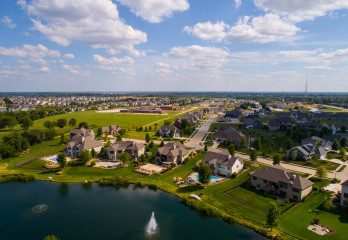Written by: Sam Wurm
Here's Why Recent Interest Rate Cuts May Not Be a "Good" Thing for Buyers
In a recent article posted by CNN, a writer explains that interest rates have more than doubled since 2020, and that this was a large contributing factor to one of the most unaffordable housing markets in history. While the first part of this statement is true, and interest rates have doubled since 2020, higher interest rates are not what led to the unprecedented housing prices that we see today. In fact, it’s the opposite.
The Early Pandemic Boom: A Double-Edged Sword
Back in 2020, as interest rates hit historic lows, buyers were thrilled. Lower rates meant more purchasing power, enabling many to afford larger homes while keeping monthly payments manageable. On the surface, it seemed like an incredible opportunity. However, what most buyers didn’t realize was that these artificially low interest rates would spark unprecedented demand in the housing market.
The flood of buyers, combined with limited housing supply, led to bidding wars and intense competition. First-time buyers, hoping to seize the moment, often found themselves priced out of the market by investors from far away—many paying in cash. Home prices skyrocketed, with some markets seeing a staggering 15% increase in value in just one year (2020). This trend continued in 2021 and 2022, with similar double-digit price growth.
While buyers thought lower rates made homes more affordable, they didn’t account for the rapid price escalation. A home that was worth $200,000 in 2020 could easily rise to over $250,000 within two years. In essence, lower interest rates made housing more expensive due to surging demand.
Today’s Market: Lessons from the Past
What does this mean for today’s market? If history teaches us anything, it's that government intervention to lower interest rates rarely makes housing more affordable in the long run. Instead, it creates a buying frenzy that pushes home prices higher.
Over the next 6-12 months, if interest rates continue to drop, we could see demand rise again. As rates inch closer to 5%, investors may flood the market, driving prices up once more. So, buyers should not assume that lower rates equate to lower prices.
What Should Buyers Do?
If you’re looking to buy a home in the next 6-12 months, here are two key pieces of advice:
Don’t Let Interest Rates Dictate Your Decision The best time to buy a home is when it aligns with your personal and financial timeline, not when interest rates are low. Waiting for the "perfect" rate could cost you in rising home prices. For example, buyers who hesitated in 2020 due to high competition saw prices increase by 25% in some markets. Similarly, those who waited in 2022 saw price hikes of 12-15% within a year or two, despite slightly higher rates.
Be Patient in Your Home Search Buying a home is a process, often taking 2-3 months or longer. Finding the right property requires patience and careful consideration. Beyond just price and size, you’ll want to factor in the neighborhood, school districts, proximity to parks, restaurants, and shopping. Don’t rely solely on online listings—pictures can be deceiving. A home that looks great in photos might feel small in person, while a property with fewer pictures might be a hidden gem.
Final Thoughts
While lower interest rates may sound appealing, they often bring higher home prices and increased competition. Instead of focusing solely on rates, make a home-buying decision based on your unique circumstances, and don’t rush the process. With the right strategy and support, you can successfully navigate the housing market, regardless of where interest rates land.
About Sam
Executive Vice President
sam.wurm@nebraskarealty.com
Connect on LinkedIn
As Executive Vice President of Nebraska Realty and Embarc Realty, Sam drives growth and innovation, expanding the company's reach into new markets. He combines a background in sales with a focus on building systems that enhance agent success and improve the client experience.
Committed to Nebraska Realty's and Embarc Realty’s vision of delivering personalized service and exceptional results, Sam applies forward-thinking strategies to create value for clients, agents, and partners. Outside of work, he enjoys traveling, fitness, exploring new restaurants, and spending time with family and friends. Guided by his Christian faith, Sam values the strong support system around him.



